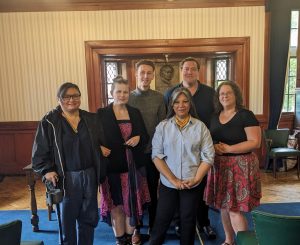The first diagnoses of HIV in the UK were in December 1981. In the 40 years since those diagnoses we’ve faced extraordinary challenges, but we’ve celebrated incredible successes too.
Prior to 1996, the story for communities most impacted by HIV (men who have sex with men and communities in the African diaspora) was of loss and trauma. With the introduction of effective treatments in 1996, the lives of people living with HIV have been transformed in so many ways.
Here’s a few things you should know:
- To the end of 2019, the most recent year for which figures are available, we know that there are 5,617 people living with HIV in Scotland.
- Over 70% of those are men.
- Almost half of all people living with HIV in Scotland (47%) are men who have sex with men.
In 2014, the UN set some ambitious targets relating to HIV. These were that by 2020:
- 90% of people living with HIV should be diagnosed.
- 90% of those diagnosed should be on treatment.
- 90% of those on treatment should have an undetectable viral load.
A person living with HIV has an ‘undetectable’ viral load when the number of HIV cells per millilitre of blood is fewer than 200. That’s the international threshold, in Scotland we report on a much lower threshold.
A person here with an undetectable viral load will have fewer than 50 HIV cells in that same amount of blood. An undetectable viral load is achieved through consistently taking treatment.
In Scotland, we achieved the UN targets in 2018. By the middle of 2019:
- 91% of people living with HIV in Scotland were diagnosed.
- 98% of those diagnosed were on treatment.
- 94% of those on treatment had an undetectable viral load.
We know now that a person with a ‘sustained’ undetectable viral load cannot pass HIV on. This is known as U=U, or Undetectable=Untransmittable. ‘Sustained’ means that a person living with HIV has to get an undetectable result from two separate viral load tests, at least 3 months apart.
U=U has been the biggest game changer for people living with HIV. Knowing that being on treatment, achieving, and sustaining an undetectable viral load means that you can’t pass HIV to a partner has shifted thinking and necessary conversations. It has contributed to improving the wellbeing and mental health of people living with HIV.
U=U is also influencing policy. The UK has announced today that it is lifting the ban on people living with HIV on serving in the military. It is only the second country globally to make this change. 30 years ago, it would have been unthinkable that people living with HIV would be classed as “fully fit’ for such service.
Scotland was ahead of the curve in the UK in introducing PrEP on the NHS. PrEP is Pre Exposure Prophylaxis and can be taken by people who are not living with HIV as a method of prevention. It has been shown to be a very effective barrier to new acquisitions of HIV.
But there are many challenges still to be faced.
The incredible success of treatment is that two individuals with exactly the same health profile (apart from one is living with HIV and one is not) now have the same life expectancy. This means many more people with HIV are living into older age which is fantastic. However, we must ensure that care options for older people living with HIV are available, appropriate, and respectful.
The clear commitment of the UK government to an increasingly privatised system of healthcare which dismantles the NHS is a threat to all people living with HIV who rely on life-saving treatment being provided for free.
The costs of treatment have come down significantly as many drugs used in the fight against HIV are coming off license and generic versions are becoming available. However, it is a matter of Public Health priority that treatment remains free so that people living with HIV can continue to protect their loved ones, partners, and others through achieving and sustaining undetectable viral loads.
Stigma is still much too prevalent. The vital work of the Fast-Track Cities movement which seeks to eradicate HIV related stigma by 2030, amongst other things, is vital. Glasgow, Edinburgh, Dundee, and Aberdeen are all signed up as Fast-Track Cities, but we should be looking to ensure that the principles of Fast-Track Cities are adopted and delivered for the whole of Scotland to benefit all people here who are living with HIV, regardless of whether they live in a rural or urban community.
People living with HIV continue to have lived experience of mental ill-health at a higher rate than the general population. This includes experiencing stigma and misunderstanding (both of which impact mental health negatively) within healthcare settings.
In 2021, this is extraordinary and we must continue to tackle stigma and discrimination of people living with HIV in all settings. It’s especially important to tackle this in the healthcare settings which are vital for people living with HIV.
The theme for World AIDS Day 2021 is:
‘End Inequalities. End AIDS’
Access to treatment and care both here and worldwide, the end of stigma, and an improvement to the mental health and well-being of people living with HIV are real challenges yet to be fully realised. It is vital that we realise them if we are to end inequality and improve the lives of every person living with HIV.
As a person living with HIV, I urge you all to take a moment today to reflect on those that we have lost in the battle against HIV and AIDS. I ask you too to celebrate the successes such as the lifting of the military ban.
Finally, I ask you to join me in ensuring that we continue to meet ongoing challenges head on, and fight to bring an end to inequality and an end to HIV and AIDS.
Ewan Summersbey is a gay man who has been living with HIV for 15 years. He currently works for a mental health charity, and is a passionate advocate for both mental health and HIV, and is the Gay Officer of Out for Independence.




